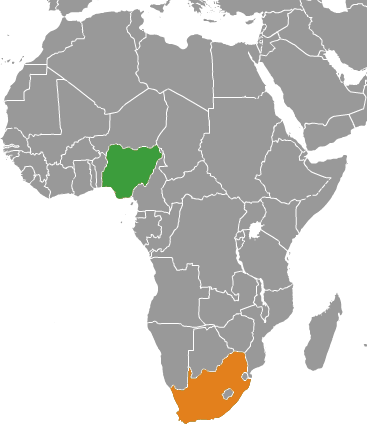 |
Whilst South Africa came into unexpected and ungainly confrontation with Western states over Libya this week, the other African power, Nigeria, has deftly come off the sidelines and joined the international action.
Whilst South Africa is baulking at recognising the rebels’ National Transitional Council (NTC) as Libya’s authority, Nigeria moved swiftly to do so on Tuesday – just as the rebels overran Gaddafi’s base-complex in Tripoli.
See reports by Africa Report and Vanguard.
Both countries are presently members of the UN Security Council.
Both voted in favour of a UNSC resolution 1973, which paved the way for the NATO air campaign that made possible the rebels’ shock victory over Muammar Gaddafi’s regime.
The TNC has been recognised by more than 40 countries, including the US, EU member states, several Arab states and twenty African countries.
See Reuter’s list on Wednesday and report Friday.
Russia and China have recognised the NTC as a legitimate political force (though not Libya's sole authority), and Beijing has already established diplomatic contacts.
Saying “Nigeria stands ready to work with the democratic forces in Libya in this transition process,” Foreign Affairs Minister Olugbenga Ashiru added:
“The unmistakable message from the battle for the control of Tripoli and other cities is that the people of Libya are anxious and determined to take their destiny in their own hands and to ensure the realisation of their own quest for freedom and democracy.”
South Africa, meanwhile, has justified its not recognising the NTC on the lack of an African Union (AU) consensus for the move – despite the twenty African states' unilateral decisions.
On Friday, after eight hours of deliberations, the AU shied away from recognising the NTC. Its rationale – put forward by South African President Jacob Zuma at the meeting – was that it could not do so as long as “there is fighting” in Libya.
Post-Gaddafi Africa
See our earlier post on South Africa's Libya dilemma here.
Some in South Africa’s ruling African National Congress (ANC) have a residual loyalty to Gaddafi for supporting their struggle against Apartheid.
The ANC has criticised Nigeria’s recognition of the NTC as “jumping the gun.”
Also, several African states have benefited from Gadaffi’s largess. He was also instrumental in setting up the AU, which he also funded generously.
Nigeria, however, has had fractious relations with Gaddafi. Last year he advocated Nigeria’s breakup as a solution to interreligious conflict there, resulting in Abuja’s ambassador to Tripoli being withdrawn for a while.
More significantly, many analysts say a key aspect of a post-Gaddafi era is that Nigeria and South Africa will compete more strongly for leadership in Africa.
“Nigeria’s financial and political influence could loom larger in the post-Gaddafi Africa, where Libyan petrodollars and the Colonel’s machinations are no longer the force they once were,” an analysis in The Christian Science Monitor said.
We need your support
Sri Lanka is one of the most dangerous places in the world to be a journalist. Tamil journalists are particularly at threat, with at least 41 media workers known to have been killed by the Sri Lankan state or its paramilitaries during and after the armed conflict.
Despite the risks, our team on the ground remain committed to providing detailed and accurate reporting of developments in the Tamil homeland, across the island and around the world, as well as providing expert analysis and insight from the Tamil point of view
We need your support in keeping our journalism going. Support our work today.
For more ways to donate visit https://donate.tamilguardian.com.

